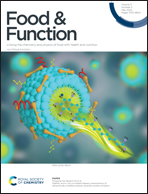Beneficial effects of sulfated polysaccharides from the red seaweed Gelidium pacificum Okamura on mice with antibiotic-associated diarrhea†
Abstract
The purpose of this study was to investigate whether Gelidium pacificum Okamura polysaccharides (sulfated polysaccharide, GPOP-1) had beneficial effects on mice with antibiotic-associated diarrhea (AAD). Compared with the natural recovery group, GPOP-1 increased the richness and diversity of the gut microbiome, as well as altered the composition of the gut microbiota. At the genus level, GPOP-1 significantly increased the relative abundance of Bacteroides, Oscillospira, and Bifidobacterium and decreased the relative abundance of Parabacteroides, Sutterella, and AF12. The metabolic pathway differences according to the Kyoto Encyclopedia of Genes and Genomes (KEGG) revealed that the metabolic function of the gut microbiota could be significantly improved by GPOP-1. Furthermore, GPOP-1 downregulated the concentrations of inflammatory cytokines, tumor necrosis factor-α (TNF-α), interleukin-1β (IL-1β) and interleukin-2 (IL-2), alleviated the pathological features of the cecum, and increased the contents of acetates, propionates, butyrates, and total short-chain fatty acids (SCFAs). Results indicated that GPOP-1 had beneficial effects on mice with AAD by promoting the recovery of the gut microbiota and mucosal barrier function, reversing metabolic disorders, downregulating the levels of inflammatory cytokines and improving the content of SCFAs.



 Please wait while we load your content...
Please wait while we load your content...